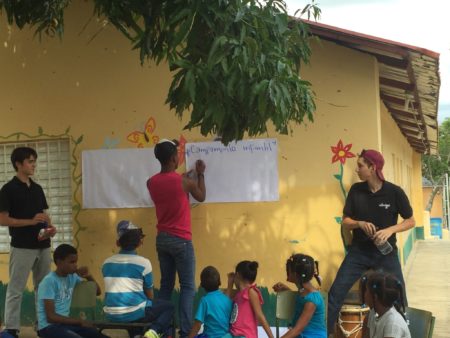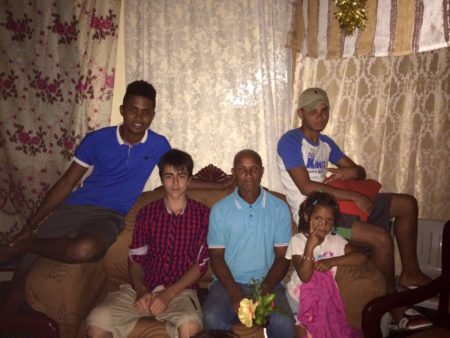
Tell me about your CBI (Community-Based Initiative). What did you learn from it?
At first I was slightly apprehensive about the possibility of my failure to reach the AMIGOS objective of successfully organizing my community to construct a community based initiative project in collaboration with the people of Maguana, my community. I thought that I would find trouble with meeting so many new people and then motivating them to work with me on a project of such magnitude. But I quickly found that the people of Maguana are amiable and open-minded to new propositions, and they inspired confidence in me to be a leader.
What part of the AMIGOS training has had the most impact on you?
In addition to the intimacy and kindness I found as a member of the community, I was able to adapt in my new environment and maintain a level of professionalism as an AMIGOS participant because of the training I received from the organization. The 4 days of briefing I received before entering my community assisted me in being a catalyst for positive change once I was in it by changing my mindset surrounding AMIGOS and its mission. This training gave me the insight to collaborate with my community to identify the health and/or environmental problems that people wanted to address. Among many other things, I was educated in strategies for public speaking, teaching small children of the community, and adjustment tactics to avoid culture shock. These aspects of the AMIGOS training I received were what had the greatest impact on me.
Tell me about some of the relationships/partnerships you developed in Maguana.
I was living and working with two other AMIGOS participants my age from the United States, one from Texas and one from California. Living in New York in a place very different from where they live, I had many preconceived notions about what those other regions of the US were like. As my partners told me more and more about their lives in the US and I described my own to them, it became apparent that AMIGOS not only facilitates a cultural exchange and mutual understanding among its participants and the Dominicans in their communities, but also between participants.
The community where I stayed is very close to the border between the DR and Haiti, so I also interacted with many Haitian community members, all of whom speak their native Creole, a French-based dialect. I have been studying French in school for nearly 5 years, so I was actually able to communicate with many Haitian children even if they didn’t speak Spanish.
What was your host family like?
There are 8 people living in the house I stayed in: my host mother, my host father, my 4 host brothers (ages ranging from 10 to 19), and my host sister (5 years old). This was technically my “host family”, but in reality, the entire community acted together to make me feel safe, secure, and loved. After my first week of staying in Maguana I stopped feeling like I was being hosted and started to acknowledge the fact that the people I was interacting with had accepted me into their community with the intentions of making me part of their families. As the summer went on I started to feel like I never wanted to go back home.
Do you feel like AMIGOS has changed you as a leader? If so, how?
My trip with AMIGOS this summer was the most remarkable experience of my life. My multicultural understanding of the world outside NYC which has been developed and strengthened this summer, the community development I advanced in Maguana, and the partnerships I built which empowered me as a young leader are all a result of the amazing opportunity Amigos de las Americas offered me.


